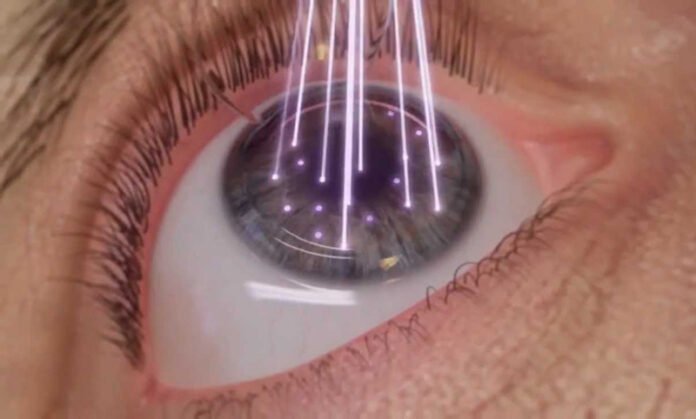The eyes are our windows to the world and the most sensitive sensory organs. Sometimes, there are issues like nearsightedness (myopia- when distant objects appear blurry), farsightedness (hypermetropia- when nearby objects appear blurry), or astigmatism (when near and distant, both visions are blurred). In such cases, one way to correct the vision is to use corrective glasses or lenses. However, both can be a hassle. Another option that may be considered is a a Lasik surgery.
Laser-Assisted in situ keratomileusis, commonly known as LASIK, is one of the most common surgeries used by eye surgeons around the world to permanently correct vision problems. Also known as laser eye surgery or laser vision correction, it is a refractive surgery whereby a specialized laser, i.e. excimer laser, is used to alter the shape of the cornea. Due to the changed shape or curvature, the required refraction is achieved, light bends perfectly from the cornea, and the vision is corrected.
- How is LASIK surgery done?
In this process, a flap is cut in the cornea using a laser device (keratome). The flap is then folded back, and the stroma (middle section of the cornea) is revealed. After that, with the help of computer-generated pulses, the laser vaporizes a portion of the stroma, thus replacing the cornea flap. This process takes hardly 20 minutes.
- Are there any complications?
Some patients might experience discomforts in the initial few days after Lasik surgery. There could be temporary effects like-
- Glare, halos, or double vision- There could be increased sensitivity to light, experiences of glare, halos around images in bright light, and in some cases, double vision. You may also have some difficulty in seeing at night after the surgery.
- Dry eyes- Due to Lasik surgery, there is a temporary reduction in the production of tears. Due to this, the eyes may feel dry for around six months or so following the surgery. Dry eyes can impact the quality of vision, but this is normally a part of the healing process, and eye drops are given for this.
- Under corrections/Over Corrections/Astigmatism- If too less, or too much of the tissue is removed from the cornea, the vision quality won’t be what you expect it to be after surgery. Under corrections can be fixed by getting another laser surgery within a year, but overcorrections are sometimes trickier. Similarly, uneven removal of tissue may result in astigmatism. In this case, another surgery might be required, or you may have to use glasses or contact lenses.
- There could be other issues such as-
- Infection
- Excess tears
- Abnormal growth of outer corneal tissue
- Minor bruises in the eyes
- What are the conditions under which you should not consider Lasik surgery?
Lasik surgery may not be advised to you under the following conditions-
- If you suffer from any autoimmune disorders or have a weakened immune system.
- If you have dry eyes, lid disorders, injuries in the eye, or have eye diseases such as herpes, glaucoma, cataracts, etc.
- If you or someone in the family has a cornea that is thin and bulging.
- If the vision has changed due to medicines, hormonal fluctuations, pregnancy, or age.
- If you have fairly good vision or have severe myopia.
- If you play contact sports, where there are chances of getting facial injuries.
- What to do before the surgery?
If you want to know what the preparatory process for the surgery shall be, then consider the following points-
- Costs- This is an elective surgery and is usually not covered under a majority of the medical insurance plans.
- You may not be in a position to drive immediately after the surgery- medicines can make you dizzy, and your vision could be blurry. Further, eyes will need some time to adjust and heal. So, have someone there with you.
- Ensure that there is no eye infection- Avoid eye make-up a day before and after the surgery, clean your eyelashes properly, ensure there is no debris.
- Switch to glasses a few weeks before the surgery if you are wearing lenses, as they tend to change the shape of the cornea. Wearing lenses may lead to faulty assessment.
- Provide an honest medical and surgical history to the doctor so that the assessment and preparatory examinations are correct.
It is a short, but crucial process. You should evaluate your options and needs carefully before committing to getting the surgery.
- So, is it a good idea to get the Lasik surgery done?
After the Lasik surgery, there are very good chances that you’ll have an improved vision, even 20/25 or better. More than 80% of people no longer need glasses or lenses after the surgery, and the maximum number of people who undergo Lasik surgery are happy with it. There are, however, some reports of there being the need for surgery again or the need for glasses/lenses as the age increases. Eventually, it is your personal decision and the doctor’s prerogative to assess whether the eye surgery will be a good idea for you. You should decide based on your expectations, preferences, and the ability to tolerate risks. Proceed when you are convinced after a detailed discussion with your doctor.
